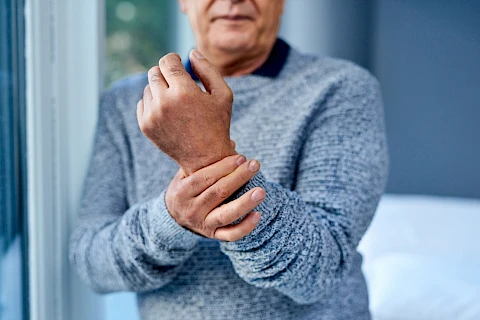
Many seniors experience increased joint pain during cold or stormy weather. Understanding why this happens and learning to manage the pain can make a big difference in their quality of life. Senior Helpers Memphis will look at the science behind weather-related joint pain and offer practical tips for managing it effectively so seniors can enjoy a pain-free fall and winter.
Why the Weather Affects Our Joints
Various weather conditions can aggravate joint pain, and there are scientific reasons why this happens. Changes in barometric pressure affect the air pressure around us. When the barometric pressure drops, which often occurs before bad weather, tissues in the body can expand and put pressure on the joints, leading to pain and discomfort.
Cold temperatures also play a role. The fluid inside the joints can thicken in colder weather, making them stiffer and less flexible. Muscles around the joints can tighten and become less efficient, which can contribute to the pain.
Finally, humidity is another factor. High humidity levels can increase the swelling and stiffness in joints, making bad weather even more problematic for seniors with existing joint conditions.
Types of Joint Pain Affected by Weather
Not all weather-related joint pain is the same. If seniors have arthritis, they may notice worsened symptoms in bad weather. Arthritic joints are sensitive to changes in barometric pressure and temperature, leading to increased stiffness, swelling, and pain during cold or rainy days.
Ever heard someone say they can "feel" the weather in their old injury? There's truth to that. Old injuries, such as fractures or sprains, can become more painful in cold or stormy conditions. This is likely due to changes in barometric pressure and reduced circulation in colder temperatures.
Other types of joint pain common in seniors, such as bursitis or tendinitis, can also be affected by bad weather. Reduced blood flow and thicker joint fluids in cold weather can exacerbate these conditions, making movement more painful and difficult.
6 Practical Tips for Managing Weather-Related Joint Pain in Seniors
So what can seniors do to ease their discomfort when their joint pain flares up? Try these tips and find out which ones work best. Don't forget to consult a healthcare provider, who may offer alternative therapies. They'll also want to know if seniors are starting new exercise routines.
- Stay warm: Dress in layers and wear warm socks and gloves. Don't forget to keep the home comfortably heated too.
- Stay active: While it might be tempting to curl up and snooze when it's cold, gentle exercise and stretching can help reduce joint pain in seniors. Activities like walking, swimming, or yoga can keep the joints flexible and the muscles strong.
- Eat (and drink) well: Staying hydrated is essential for joint health. Drinking enough water and consuming a diet rich in anti-inflammatory foods, like fruits, vegetables, and fish, can also help manage joint pain.
- Use of over-the-counter relief: Heating pads, topical creams, and over-the-counter pain relievers can provide temporary relief from joint pain. Always follow the instructions and consult a healthcare professional if seniors are unsure of what's right for them.
- Get regular check-ups: Regular medical check-ups are crucial for maintaining joint health. A doctor can monitor seniors' joint condition and recommend adjustments to their treatment plan if needed.
- Build a support system: Family, friends, and professional caregivers can offer emotional and practical support to help seniors manage their joint pain more effectively.
Stay Pain-Free With Senior Helpers
Managing weather-related joint pain is vital for maintaining seniors' quality of life. An in-home caregiver can encourage them to take the right steps to relieve pain and help them follow their healthcare provider's advice for medications and movement therapy.
For personalized care and support in Memphis, Bartlett, Germantown, and Collierville, contact us at Senior Helpers Memphis. We look forward to meeting you!